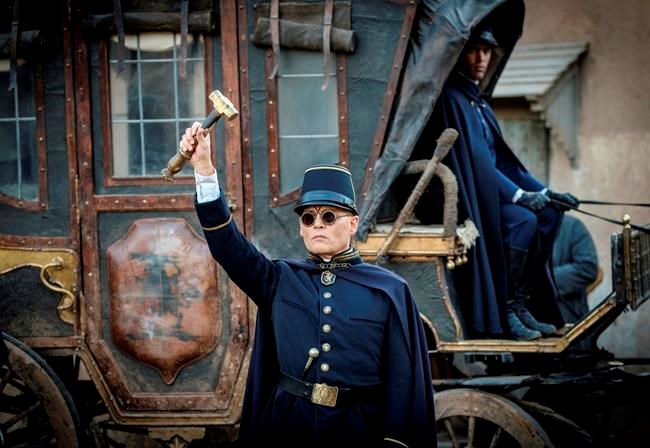Watching Mark Rylance play a man of basic decency getting swallowed up by an evil world — and a sadistic Johnny Depp — in “Waiting for the Barbarians," I absent-mindedly jotted down in my notes: “Nobody does basic decency like Mark Rylance.”
Then I remembered: Nobody quite does INdecency like Rylance, either. Watch him play a villain, a creep, or maybe a scheming Shakespearean king, and you'll be chilled to the bone.
Comedy or tragedy, prose or verse, stage or screen: This is simply an actor who couldn't strike a false note if he tried. And if he seems perfectly cast as the purposely nondescript Magistrate in “Barbarians,” a visually striking but frustratingly slow-moving film based on the award-winning novel by J.M. Coetzee, it’s perhaps because, well, he's well cast in pretty much everything he does.
And it's no easy task, playing a nameless man, neither hero nor villain, serving a nameless Empire in a nameless time in the border region of a nameless land. It’s tricky precisely because, as you may have guessed, there's so much that's necessarily left unspecified in this adaptation from Colombian director Ciro Guerra, with a screenplay by the Nobel-winning South African author himself.
Coetzee’s allegorical novel reflects on themes of power, war, torture, the evils of colonialism and the need humans have to demonize others in order to subjugate them. It’s also about “otherizing” the foreigner, in order to more efficiently hate. Many have pointed out parallels to our modern world. Guerra himself says the story, which at first seemed from another time, “somehow morphed into a story about our present age.”
A novel like Coetzee's invites readers to fill in the blank spaces. On a screen, we tend to crave more specificity. The result, coupled with a too-languorous pace, is a film that's intermittently engrossing and always interesting, but less potent than it could have been.
“Barbarians,” is told in four chapters: Summer, Winter, Spring and Autumn. We begin in summer, with an arresting tableau of a desert landscape, snow-capped mountains far in the distance. (The movie was filmed in Morocco and Italy.)
The Magistrate, a loyal employee of the colonizing Empire who governs with an easy hand, is heading toward retirement when suddenly Colonel Joll (Depp) turns up. The Colonel has heard there's trouble brewing among the nomads who dwell along the border.
At first, Depp sounds, in tone and inflection, like he’s efforting his best David Bowie impersonation. His vibe is menacing and a little hip, too, with white gloves and those dark round glasses telegraphing Hollywood. “They protect one’s eyes against the glare of the sun,” he explains to the bewildered Magistrate, and somehow it sounds very nefarious.
The Magistrate tells him there's never been trouble in these parts — “once in every generation there is an explosion of hysteria about the barbarians,” he says, but it never amounts to anything.
The Colonel, though, has a fool-proof interrogation method. “Pain is truth,” he explains. “All else is subject to doubt.” The results of his method — “first lies, then pressure, more lies, more pressure” — will become immediately clear when a sick boy and his elderly uncle, who came to town seeking medicine, are accused of stealing sheep. After their interrogation, one is dead, and the other has confessed to a barbarian plot.
And so it goes, with the Magistrate trying desperately to hold on, both to his job and his vaguely moral grounding. In Winter, “the girl” is introduced — a nomad girl who’s been maimed by interrogators, and for whom the Magistrate develops strong feelings. (She's affectingly played by Mongolian actress Gana Bayarsaikhan, in her first major film role.)
Late in the film, Robert Pattinson arrives as Mandel, another nasty officer; the charismatic actor injects some needed energy into the proceedings. He has some good scenes, but the best words throughout the movie fittingly go to Rylance, including these, which somehow stick in the mind:
“We have no enemy that I know of. Unless we ourselves are the enemy.”
___
“Waiting for the Barbarians,“ a Samuel Goldwyn Films release, is unrated by the Motion Picture Association of America. Running time: 112 minutes. Two and a half stars out of four.
Jocelyn Noveck, The Associated Press




